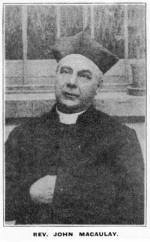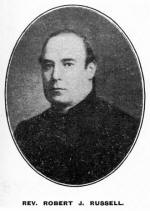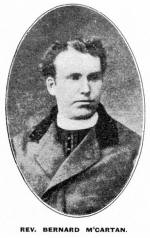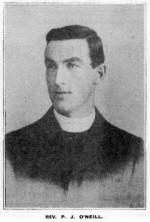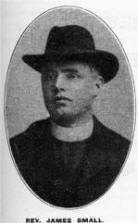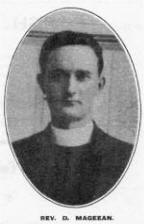IX. – THE DECLINE OF ULAIDH.
Defeat.
Another century passed by, and the fortunes of the Kingdom of Ulaidh were on the wane. Against the Crew Hill the enemies of the Ulidians seemed relentless in their attacks. In 1099 Donal O’Lochlainn led an army of the Northern Hy-Niall across Toome into Ulidia. He reached the Crew Hill and found the Ulidian forces ready for battle. In the engagement that followed the Kinel-Owen were victorious. The victory gave them an opportunity of inflicting a lasting humiliation on their old enemies. They cut down the Sacred Tree of the Crew Hill, and compelled the Ulidians to give hostages.
Retaliation.
Twelve years later the Ulidians had recovered so far as to be able to retaliate for the insult offered to their national honour. In 1111 A. D. they led an army into the territories of the Hy-Niall, and cut down the sacred trees of Tullaghogue (Os), under which from time immemorial the Kings of the Kinel-Owen were inaugurated.
O’Rorke and O’Carroll at the Crew.
The Kinel-Owen had their revenge. They came in 1148 under Murtagh Mac Loughlin and dethroned Cuuladh O’Donlevy King of Ulaidh, and set up Donacha, a prince of the same family, in his place. Tighernan O’Rorke and Donogh O’Carroll came with an army to the assistance of the ill-fated monarch. They established him again on his throne ; but no sooner were they gone than Cu-uladh was expelled by the Ulidians themselves, It was this same Tighernan O’Rorke, Prince of Breffney, who four years later was doing the penitential exercises on Lough Derg, when his wife Devorgilla eloped with the infamous Dermot Mac Murrough. It may be remarked in passing that Devorgilla soon afterwards retired to the Abbey of Mellifont, where she spent the rest of her days in works of penance and charity. O’Carroll, who accompanied O’Rorke to Craobh-Tulcha, was the King of Oriel that endowed the famous Cistercian Abbey of Mellifont.
Fuit llium.
After this we hear no more of the Crew Hill in Irish history. Its fame and munificence and hospitality had been the theme of minstrels in the days of King Connor Mac Nessa. With the falling fortunes of its chiefs Craobh Tulcha lapsed into oblivion. Its very site was almost forgotten. So much so that an otherwise accurate and painstaking antiquarian of the last century wrote : ” It would appear that the place lay towards the north of the modern county of Down, somewhere in Castlereagh.”
A Poet of the Fourteenth Century.
Here are a few lines translated from a topographical poem written in praise of the chieftans of Ulaidh by John
Mor O’Dugan, who died in 1372 A.D.
” Let us lift our heads towards Creeve-Roe.
The chief Kings of Uladh let us name,
The lands of hospitality and spears,
The Dunlevys and the Hoeys.
” Of their nobles are men of slaughters,
The O’Haddys: and the Keogans.
Great are the spoils they bring from plunder,
The O’Laverys and O’Lawlors.
The O’Lynches have proud champions,
And the O’Mornas red-complexioned,
We have visited their territories,
Let us cease from naming the High-Kings.”
X. – RELIGIOUS REVIVAL.
De Profundis Clamavi.
It is needless to tell that religion and morality must have suffered during the constant wars that devastated the Province of Ulster. It is when matters seem nearing their worst, however, that the providence of God manifests itself. For instance, in the case of the Norman Invasion, when Danish wars and incessant strife had wrought havoc in the Province of Leinster, and prepared the way for the foreigners, God raised up a holy and learned ecclesiastic – the great St. Laurence O’Toole – to be shepherd over His flock during the terrible crisis. He showed a similar providence in regard to the people of Antrim, Down, and Armagh, whilst the Kingdom of Uladh was tottering to its ruin amidst the clash of arms. The Prelate who saved religion in the North at the time of the downfall of Uladh was St.
St. Malachy.
Malachy O’Morgair.
We have a beautiful account of the life and times of this Saint, written by his friend St. Bernard. St. Malachy was born in 1094, and spent his youth at the famous School of Armagh. Sprung from pious parents, he was from the first a man of prayer and a diligent student. At the age of 25 he was promoted to the priesthood. Soon after, he was entrusted by the Archbishop Celsus with the serious duty of correcting the various abuses that had grown up during years of incessant war. He re-established the public singing of the Canonical Hours, and urged upon all the frequent reception of the Sacraments.
His Zeal.
” Behold him,” says St. Bernard, ” plucking up and pulling down and scattering with the hoe of his eloquence, making the crooked ways straight and the rough ways plain. You would say he was a raging fire burning down the rank weeds of crime. His eye spared not disorder, indecorum, nor what was wrong wheresoever it presented itself ; but as hail sweepeth the green figs from the fig tree, and as the wind scattereth the dust from the face of the earth, so did he exert all his might to remove from before his face and blot out from amongst his people all abuses, and in their place, like a good legislator, he established the laws of the Church.” The ancient Monastery of Bangor, which had been reduced to ruins by the Danes in 812, he restored to something like its former glory.
Bishop of Connor.
He was made Bishop of Connor at the age of 30. ” He soon discovered,” writes St. Bernard, ” that it was not to men, but to beasts, that he had been sent Christians in name, but Pagans in reality.” What the fruits of his zeal were, we are told by St. Bernard : ” Churches were rebuilt and supplied with priests. The rites of the Sacraments were duly administered, confession was practised, the people attended the church, and concubinage was suppressed by the solemnization of marriage. In a word, so completely were all things changed for the better that you can apply to that people now what the Lord said by His Prophet : They who were not my people are now my people.”
Archbishop of Armagh.
From the See of Connor he was promoted to the Arch-Archbishop of bishoprick He accepted this dignity only under .
obedience. when he felt that his mission was accomplished in the Primatial City, he retired to the Bishopric of Down. There he hoped to end his days in peace amongst the monks he had established at Downpatrick. But he was not allowed to remain undisturbed in his beloved retreat. He had to make two journeys to Rome in connection with the organization of the Irish Church. When he reached the Monastery of Clairvaux, on the second journey, the sickness of death was upon him. In the holy atmosphere of this monastery that he loved, and attended in his dying moments by his friend St. Bernard, he passed to his reward on the Feast of All Souls, 1148.
